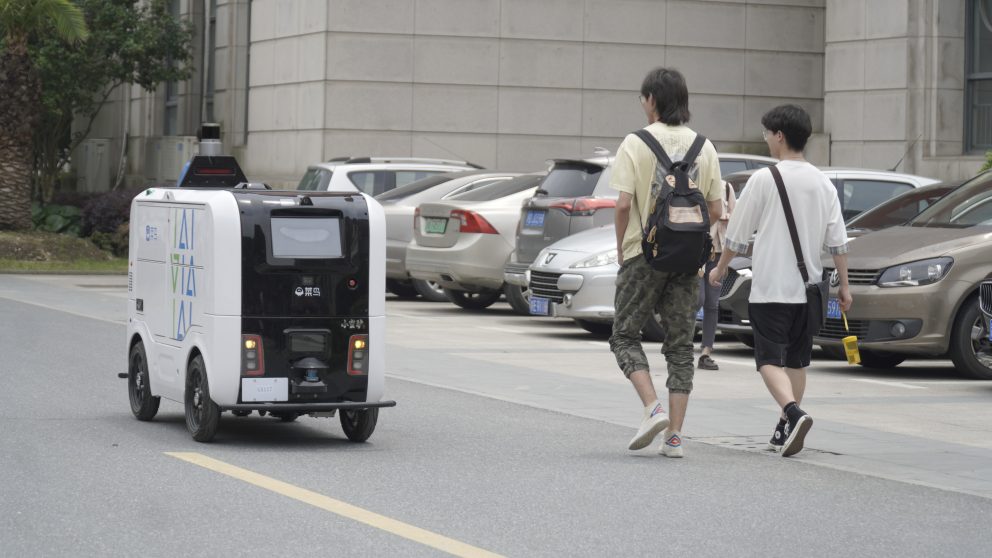
Robot in action delivering packages on a university campus in Wuhan, China
Imagine a robot riding the elevator up your tower block, knocking on your door, and delivering the package you ordered an hour earlier: That’s the future of e-commerce in China.
Tech giant Alibaba Group sees a fleet of robots as a fast, reliable and relatively cheap way to fulfill the burgeoning demand for online shopping across China, the world’s largest consumption market.
In a big step towards hitting this goal, Alibaba is deploying 1,000 delivery bots across Chinese university campuses and urban communities this year. The bots, called Xiaomanlv or “small donkey” in Mandarin, can deliver about 50 packages at a time and as many as 500 boxes in one day, covering 100 kilometers on a single charge.
The bots pick up parcels at a local courier drop-off point and make their way to your building, trundling along sidewalks and in bicycle lanes. To be sure, they can’t navigate a flight of stairs yet, but the technology is steadily improving.
In the future, the bots could gradually replace forklifts in factories, dispose of medical waste in hospitals and even move luggage around airports.
The idea is that these bots will “learn” how to navigate obstacles safely in low-speed minor roads and cul-de-sacs, such as serving a college campus or within a housing estate. Damo Academy will analyze insights gathered from these early models and then upgrade the bots to be safe to maneuver even on public roads.
“In three to five years, we hope to make progress in autonomous driving in faster speed scenarios and make deliveries over longer distances,” said Wang Gang, head of Damo Autonomous Driving Lab in Hangzhou, in an interview with Alizila.
Last-mile delivery has always been the knotty problem of e-commerce. It’s costly, time-consuming and largely unmapped. This final leg in a journey that stretches from the manufacturer to the buyer can flummox human couriers. Delivery people can get lost trying to find a flat in a tower block or navigate a large housing estate.
Alibaba’s robots will be able to make the trip without deviations or smoke breaks. Alibaba’s algorithm plots the fastest route for the robot to your door.
The robot can predict the intended movement of passengers and vehicles up to 5 to 10 seconds in the future and safely avoid collisions. In test runs, 99.9999% of the time, the Xiaomanlv’s auto-driving algorithm manages without human intervention. For industry experts, this is known on a scale of Levels 0 to 5, as Level 4 meaning a high degree of automation.
The very top of the automation spectrum, Level 5, seems like a distant nirvana for autonomous-driving experts, given the reams of traffic data needed to make the robots and self-driving cars safe to travel on busy public roads.
Level 4 is sufficient to solve the last-mile conundrum of e-commerce. More importantly, the robot’s positioning technology allows it to operate even where there’s weak or no GPS signal, making it a reliable deliveryman even outside China’s supercities.
China’s e-commerce market is the largest in the world and its growth has stimulated the swift development of logistics to fulfill customers’ orders. The coronavirus pandemic has also accelerated the shift in consumption from offline to online and heightened customers’ demand for contactless delivery of packages.
Package deliveries topped 830 billion in mainland China last year, nine times the volume of 2013, according to China’s Post Office.
At the same time, there are fewer able-bodied couriers in China, one of the fastest aging populations globally. The World Health Organization expects the percentage of people over 60 years old in China to hit 28% by 2040.
“We do not have enough labor to deliver so many packages to consumers … it's impossible without automated technologies. So, this is why Xiaomanlv is very important,” said Damo Academy’s Wang, who is a key man in Alibaba’s drive to develop the bots. He spent over a decade researching artificial intelligence as an academic and now wants to put theory into practice.
“I hope to build AI products that can have practical application and a big social impact, rather than academic impact,” said Wang. “Alibaba’s Damo Academy’s objective is to develop products that can be used - so this aligns well with my motivation.”

As consumers demand faster and more flexible delivery schedules, e-commerce companies are racing to rewire their logistics networks. The Hangzhou-headquartered group offers customers in China one-hour delivery, half-day delivery and next-day delivery.
“Nowadays, consumers have higher expectations such as delivery to their building so that they do not have to walk for miles to get their package,” said Wang.
Damo Academy is working closely with Alibaba’s logistics arm Cainiao to deploy the bots, known in the industry as autonomous mobile robots.
Delivery companies such as FedEx and UPS still handle most packages globally. However, a few retailers are exploring more cutting-edge solutions such as drone deliveries. That said, there are relatively few drones in circulation, given the high level of regulatory clearance needed. Delivery robots, or bots, on the other hand hold more promise in terms of mass deployment.
Big breakthroughs in the field of autonomous driving have largely depended on that lightning bulb moment when one or two engineers find inspiration from years of research. Many companies are still developing prototypes when it comes to autonomous driving, particularly when it comes to carrying passengers.
Alibaba’s approach is to build steadily on the insights gleaned from the bots already in action, increasing the likelihood of developing a more mature and useful algorithm rather than relying on engineers in the lab.
Wang believes that Alibaba’s algorithm is strong enough not to need expensive, high-definition sensors that some companies’ prototypes need to navigate.
“So, we can lean more on our algorithm to achieve a low-cost, mass deployment of the robots,” said Wang.
To receive the latest news directly in your inbox, sign up for the weekly Alizila newsletter




